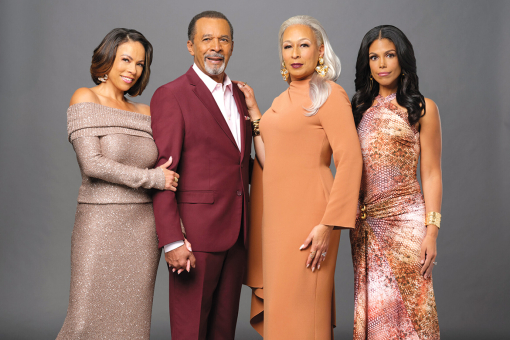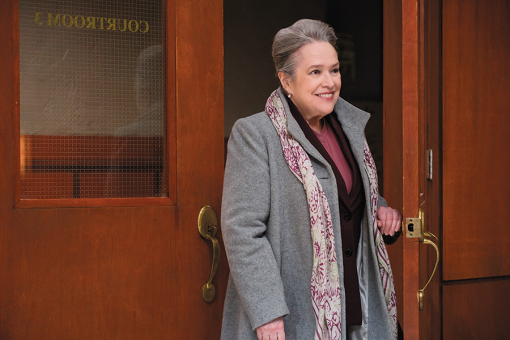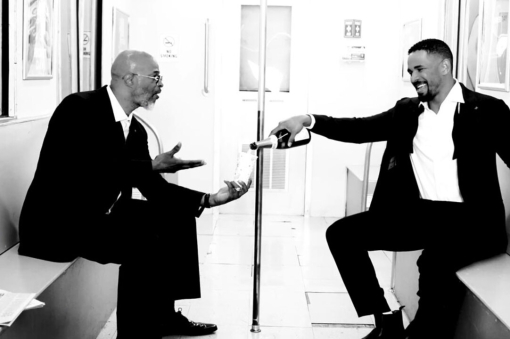After graduating from Boston University, Nina Tassler thought she'd entertain Broadway audiences as a stage actress.
Instead, in the years that followed, the daughter of a Jewish father and Puerto Rican mother ascended to the top of the entertainment industry as a television executive. Over the course of her tenure at CBS, she developed landmark shows and helped make women's voices heard in network programming.
Tassler began her career when she moved to Los Angeles and found work at talent agencies before joining Lorimar Television in 1990. (The production company merged with Warner Bros. three years later.) She moved to CBS in 1997 and quickly rose through the ranks, eventually becoming senior vice-president of drama development. In 2004, Tassler took on the position of president of CBS Entertainment. Under her leadership, CBS experienced success with shows including The Big Bang Theory, How I Met Your Mother and the NCIS and CSI franchises. Tassler was named chairman of CBS Entertainment in 2014 and stepped down from that position at the end of 2015.
After leaving CBS, Tassler wrote (along with Cynthia Littleton) What I Told My Daughter: Lessons from Leaders on Raising the Next Generation of Empowered Women, published in 2016. She is currently a coproducer on the Broadway show The Cottage, directed by Jason Alexander.
Additionally, she has served on the board of directors of the Television Academy Foundation as well as the Geena Davis Institute on Gender in Media, a nonprofit organization that seeks to create gender balance and reduce negative stereotyping in family entertainment. Tassler's career put her in a unique position to seek gender parity. She explained: "What has been increasingly important to us as a network and to me personally over the years is to continue to create opportunities for women in lead roles."
She was interviewed in September 2015 by Amy Harrington for The Interviews: An Oral History of Television, a program of the Television Academy Foundation. The following is an edited excerpt of their conversation. The entire interview can be screened at TelevisionAcademy.com/Interviews.
What were some of your interests growing up?
I gravitated toward theater from the time I was eight or nine. I would write plays, cast my friends and direct the plays. My love of theater and performing was a big part of coming from a Latin- Jewish background — a tradition of storytelling is very much a part of both cultures.
What did you want to be when you grew up?
I wanted to be an actress. I went to Boston University and majored in theater.
What did you do after you graduated?
I stayed in Boston for a summer, doing plays. Then we had a bit of a pit stop in New Jersey — I met my husband [actor Jerry Levine] in college, and we stayed with his mom to save some cash and then moved to New York City in 1980.
What did you do in New York?
What didn’t I do? I had done an internship at the Roundabout Theatre Company while in college, so I went back there. I got a chance to work behind the scenes building sets, working in the box office, working on a fundraising campaign ... I was also waiting tables, like every good actress in New York, plus I was auditioning. And I continued to build my craft, so I took acting classes, dancing lessons, vocal lessons, everything to keep my instrument tuned.
Why did you move to Los Angeles?
My husband had come to California to test for a pilot. He did not get the pilot, but he did audition for and get a movie — he played Stiles in Teen Wolf. I was not thinking of moving to California yet, but he said, "There's great opportunity here. I think you are going to really love it."
Was your goal to pursuse acting?
Yes. I had friends who had started a theater company in Venice, so I immediately went to work with them. But that wasn't paying the bills. I had one other friend in California, my roommate in college and my best friend to this day, Geena Davis. Geena introduced me to her agent, who was kind enough to interview me. I started interviewing for jobs and ended up as a receptionist in a small talent agency, The Irv Schechter Company.
What did you think of your first behind-the-scenes look at an agency?
I was very intrigued. I was a receptionist and an assistant to two agents. I like doing a lot of things at one time — so answering phones, talking to acting clients, dealing with packages coming in ... I could do all of that. I realized very early on that the questions that I would ask would be the same questions that other actors would be asking about auditions. The talent agent I worked for, David Windsor, was such a lovely man. Very early on, he said, "I think you can be an agent if you're interested." He franchised me as an agent, and I started signing my own clients.
How did you move to Triad Artists?
I got a call from [partner] John Kimble, saying, "I want to offer you a job as my assistant, initially, to learn about packaging." Television packaging was just starting up.
Why did you eventually decide to leave Triad?
I look back on agenting as truly one of the great learning experiences of my career. I love to sell; I love negotiating deals. I love representing actors and writers, and toward the end of my time at Triad, one of my primary territories was Lorimar Television. The movie of the week business was very big, and Lorimar was doing a lot of them. I knew people at Lorimar — the casting directors, the business affairs people, and I thought, "I like that studio." When you're an agent and you've done your deal and your client is working, you're out of it. I would get very involved in the scripts and packaging a piece of material with the actor, and once you set up that project, it's time to move on. I had trouble separating. I heard about this one job at Lorimar Television — director of movies and miniseries — and I thought, "Let me just try to stick my toe in."
In 1993, Lorimar merged with Warner Bros. How did that impact your job?
When I first got to Lorimar, the drama series business began to take off. I transferred from movies of the week into drama series, and stayed in drama series the whole time I was at Lorimar/Warner Bros. One of the projects we developed was ER, which was truly one of the greatest experiences of my life. One, I got to work with John Wells, who is a very dear friend. And the journey that script took to making television history was so extraordinary. I remember that cast like it was yesterday. I remember watching the dailies. We did a test for ER that was, to this day, one of the best tests of any pilot I've ever seen.
You moved to CBS in 1997 as head of drama for CBS Productions. What was the state of CBS at that time?
We were in fourth place. CBS didn't quite know what their brand was. There were a lot of series that had been on the air for a while that were skewing a little older. When I got there, I said, "What do I want to watch? What do my peers want to watch?" I immediately started taking a high volume of pitches.
One of the biggest shows that you were involved with was CSI. How did you first become aware of it?
I have a tradition, maybe it's a superstition, but I never say no to hearing a pitch, ever. I always say, "You never know when the next big idea is going to walk in the door."
Jonathan Littman was running Jerry Bruckheimer's production company at the time and called me up. We were dangerously near the end of selling season; he begged, "Please, please take this pitch. Even if you don't buy it, I promise you, it will be one of the most entertaining pitches you've ever heard." It was a new writer. Anthony Zuiker came into my office and proceeded to pitch the most exciting, unique, engaging pilot. He was such a character, larger than life. Forensics, Las Vegas, autopsies — I loved the science of it and was intrigued. So even after that pitch had been passed on by everybody else, we bought it in the room and developed the script.
Talk about the importance of women in lead roles in shows like The Good Wife.
What has been increasingly important to us as a network and to me personally over the years is to continue to create opportunities for women in lead roles. Not only in the development of the script, but also in acknowledging that women who are actors have families, lives, oftentimes children ... and we wanted to be mindful of that from the beginning. As we were creating shows, we said, "How can we take lifestyle into accountwhen we are developing projects that feature women at the center?"
Look at the cast of The Good Wife with Julianna Margulies — Christine Baranski, Alan Cumming, Zach Grenier — these are incredible actors, and you were interested in following their storylines. Elementary with Lucy Liu, Madam Secretary with Téa Leoni — you are invested in multiple storylines in any given episode. We always kept a very watchful eye on production being able to find ways to relieve the lead actor, because it's a massive amount of work.
In 2004, you were promoted to president of CBS Entertainment.
I was very fortunate in that I was promoted to president, but the woman that I reported to, Nancy Tellem, had also been promoted to overseeing both the studio and the network. Nancy was incredibly generous at involving me in all the dealmaking and the process of running the network.
As president, I had more oversight of specials and daytime and late night. And I had to bring myself up to speed with comedy development. Wendi Trilling was the head of comedy at the time, and one of the first scripts she gave me was How I Met Your Mother. I became an advocate for that project.
Another big comedy success was The Big Bang Theory. You shot the pilot, and everybody agreed it didn’t work. Then you gave Chuck Lorre a second chance. Why?
There was so much about the pilot that did work. But there were parts of the script that didn’t, and we had to recast an actress. Chuck is such an extraordinary talent. He had a great concept and wonderful chemistry between the two leads, so I asked him if he would try again. And he immediately said, to his credit, “You’re right. I know I can do better. Thank you for this opportunity, and we’ll figure it out.” Sure enough, he did. Kaley Cuoco joined the cast, and she was the secret sauce. Chuck and Bill Prady delivered a pilot script, and the rest is history.
In 2014, you became chairman of CBS. What was that next step like for you?
There was a lot more corporate involvement than I'd had in the past. As president, I became more involved with interfacing with advertisers and clients of the network — network sales were a big part of my role, giving our ad sales clients previews of what was coming up. As chairman, I had those responsibilities plus periodically doing presentations to investors and representatives of Wall Street, presentations to the CBS board. The biggest change at that time was looking at parts that needed substantial overhauls — in daytime, nighttime and late night. That became a major focus of mine.
Speaking of late night, what was it like hearing that David Letterman was leaving?
A: It sent shockwaves internally. We also had a host on The Late Late Show who was departing, so we had double duty in redeveloping late night. We came up with James Corden first. I had seen James on Broadway, in The History Boys and in a show called One Man, Two Guvnors, and he was brilliant. There was no doubt in my mind that he was special.
How did you decide on Colbert to host The Late Show?
I was an avid watcher of The Colbert Report, and when we started looking at who Stephen Colbert is, you realize he's done standup at Second City, he came out of Northwestern, he's a trained actor. He can sing, and he can dance. I went back and Googled a commencement speech he delivered at Northwestern, and I was so taken with who he is as a man, as an actor, as a philanthropist, as a father ... the more I learned about him, the more I realized this opportunity to work with him was a once-in-a-lifetime chance.
What was behind your decision to leave CBS?
From the time that I've been at the network — listening to pitches, then working as president and ultimately chairman — it's taken a lot of time and energy. I've loved every minute of it. But what I really loved was the creative process and being in the trenches, and the longer you're in these jobs, the further removed you are from that. And on a personal front, my children are growing up, my mother's getting on in years, my husband has been very patient ... I wanted a change. A word of advice I give to anybody about when and where they want to make a change: you have to know in your gut. It can’t be based on what any other person tells you to do or not do. Once we knew Stephen Colbert was going to launch and James Corden was doing well, and we were introducing one of the most well-known female superheroes in comic book history with Supergirl, it felt like I had completed a cycle. Several years ago, a very dear friend of mine passed away, and it was a really difficult time for me, and I thought long and hard about quality of life. I so appreciate all the opportunities I’ve had; I just felt in my gut that it was time to move on.
Where do you see yourself in ten years?
I’m one of those people that stays very focused on what I’m doing, and when I pick my head up, I assess where I am and take a look at what opportunity is out there. When I was an actress and had an opportunity to work as an agent, I never thought of that until the situation presented itself. Who knows what opportunities are out there ten years from now? But I hope I will be content.
The contributing editor for Foundation Interviews is Adrienne Faillace.
Since 1997, the Television Academy Foundation has conducted over 900 one-of-a-kind, long-form interviews with industry pioneers and changemakers across multiple professions. The Foundation invites you to make a gift to the Interviews Preservation Fund to help preserve this invaluable resource for generations to come. To learn more, please contact Amani Roland, chief advancement officer, at roland@televisionacademy.com or (818) 754-2829.
To see the entire interview, go to: TelevisionAcademy.com/Interviews.
This article originally appeared in emmy magazine issue #8, 2023.













